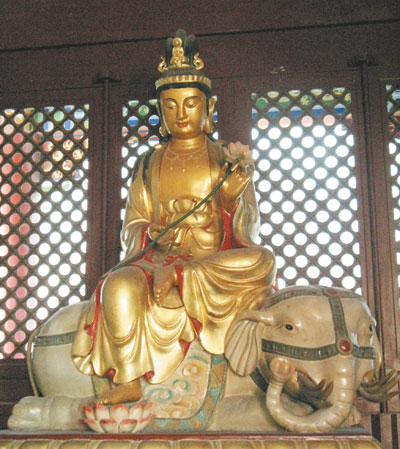
James Baquet jamesbaquet@gmail.com WHEN visiting a Buddhist temple, you may notice a rather unusual creature. Usually, seated to the left of the Buddha in the main hall, there is a figure resting comfortably on an elephant. This is Puxian (Sanskrit Samantabhadra), the Bodhisattva of Universal Virtue. He is also the One of Great Practice, which helps to explain a peculiarity about the creature he is seated on. It is an elephant. Elephants are of great importance in Buddhism, signifying as they do strength and steadfastness — appropriate traits to be associated with a Bodhisattva who was known for the steadfastness of his meditation practice. But this elephant is different. It has six tusks! These are said to represent the Six Perfections that can be achieved only through a strong, steadfast practice. These are: 1. generosity (giving); 2. virtue (morality, discipline, proper conduct); 3. patience (tolerance, forbearance, acceptance, endurance); 4. diligence (energy, vigor, effort); 5. concentration (contemplation); and 6. wisdom (insight). (The words in parentheses are other common translations of the six Sanskrit names of the Perfections or Paramitas). So Puxian’s “vehicle” (the technical name for an animal a figure sits on) symbolizes these perfections. The teachers say, “Just as an elephant untamed is a wild and dangerous thing, so is an untamed mind. And just as a trained, disciplined elephant is a great ally and source of power, so is a disciplined mind.” Thus Puxian’s elephant is docile, almost sleepy in his appearance — ready to be of service and representing a disciplined mind. | 
